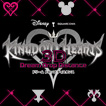KHU Roundtable #2 – Does Kingdom Hearts have Gender Issues? (Part 1)
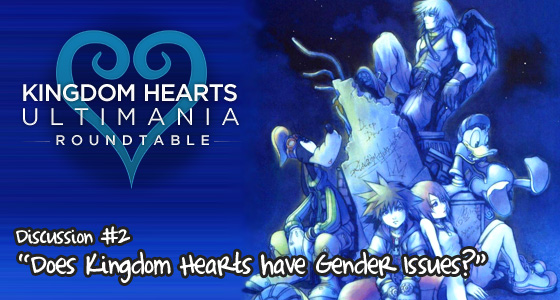
In our Second Table, we discuss the possible gender biases of Kingdom Hearts
Jackie: Our First Roundtable was such a success that we’ll continue on with another delightful discussion of Kingdom Hearts.
We’ve got a large, enthusiastic group today: Shay is one of our global moderators who’s rejoining us from the last Roundtable, Hannah is also a staff member at Kingdom Hearts Ultimania; from Monstervine.com, I’d like to introduce DizuniinoMahou (Nintendo editor and today’s co-host) and Francis (Copy editor).
Hannah: Hello there everyone, hope you’re all well! Thank you for asking me to join in on this excellent topic!
Jackie: We’ll be talking about gender this week: gender roles, relationships and dynamics.
Gender Issues in Kingdom Hearts
Jackie: Looking back in a retrospective sense, I am convinced that there was some gender bias in the first Kingdom Hearts. You have the boys either gone to save the world (Sora, Mickey) or boys gone off to destroy the world (Riku, fake Ansem). They have all sorts of grandly heroic or villainous adventures, meet people from other worlds–for better or for worse–and act as the medium for the majority of the plot telling. Then you have the girls, who are highly important as plot devices, but have one-dimensional personalities. We didn’t see much of Kairi (she was unconscious 75% of the time) and there was neither an adventure nor development from any of the Disney girls.
Before I digress, can I ask if this is the general feeling that you guys also get from the first game?
Disney’s Effect on Kingdom Hearts
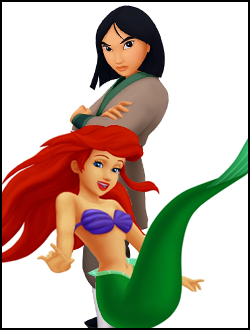
Ariel and Mulan--Disney’s active women. Who knows why they can’t have more than one female party member per game.
Hannah: In regards to gender and Kingdom Hearts, we cannot ignore the fact that a large portion of the game and its plot revolve around the Disney universe and its various worlds.
Many of the worlds that the three protagonists visit have featured in films that are based on fairy tales, particularly those regarding the Princesses of Heart. For example traditional stories such as Sleeping Beauty, Snow White, Aladdin, etc. The women in these stories are often the ones in need of rescue, though the game does not always adhere to this formula–a big exception being Ariel in Atlantica, the only female companion to join the team in the first game and fight along side you (Mulan picks up the mantle in Kingdom Hearts II). The origins of these stories go back to a time when a woman’s role in the world was the old fashioned one of the submissive sex, not active in the world and–more often in these stories–the one waiting to be rescued. It’s a common factor in fairy tales that there is a brave, admirable prince who must achieve his goal of fighting for the freedom/release/awakening of his chosen Princess/friend/love interest. Though it is also interesting to note that one of the primary antagonists in Kingdom Hearts, Maleficent, is female.
It’s clear that the main role of women in the Kingdom Hearts universe of the first game is a traditional one. Perhaps the plot writers realized this when it came to Kingdom Hearts II, in which the main love interest–Sora’s motivation–takes a greater role in the story developments, though only later in the game. Kairi could almost be said to be on an equal level with Sora in being able to wield the Keyblade, something that was said to be unique in the first game (then suddenly, everyone’s chucking them around!)
Though there is a fairly old-fashioned approach to women in the first game this is partly to be expected because of its source material, and also something that changed as the series grew. Kingdom Hearts is a modern day fairy tale and the drive for our main character–and the player, who takes Sora’s role–is to bring light, love and safety to those without it and to banish those who are opposed to those themes. The messages it sends and may teach younger players is that selflessness and love are good things. Unfortunately, it may also be said to send the message that women are likely to get into trouble and be unable to get themselves out of it.
DizuniinoMahou: Also remember that the first playable female character in the series was Birth by Sleep, a long while after the original game. So there’s definitely been some progression there.
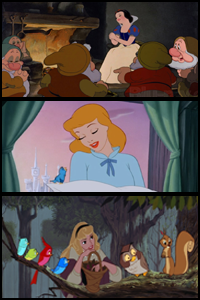
There’s no doubt that passivity was a hallmark of Disney’s earlier princesses, considering they all operated to the effect of “Someday My Prince Will Come.”
Francis: Hannah makes many good points in regards to this issue, and I’d like to focus more on the fact that due to the source material of the Disney franchises the first game dealt with–along with the social dynamic between men and women in Japan–Nomura had an easy job developing the female characters, most importantly, Kairi, the way he did. Yes, there is most definitely a gender bias in Kingdom Hearts, but this holds true for all the games in the franchise, and these biases display themselves in strangely remarkable ways as the years went by–both in what is being represented as well as the methods of said representations.
Shay: I definitely have to agree–most of the female roles and stereotyping we’ve seen in the first game does have a lot to do with Disney’s influence on the game. Most of the girls played the roles we’ve seen them play in the Disney movies–princess in distress, the ultimate romance, etc. Likewise, however, Final Fantasy female roles play the same role they did in their own games. For example, albeit slightly one dimensional, Yuffie never stopped kicking butt. I think the only role we can really judge here is Kairi, who was the ultimate princess in distress, but even she had her moments. She had a particularly strong role in saving Sora after he’d been turned into a Heartless and I believe that was our beautiful Kingdom Hearts team trying to give her some small bit of depth.
Cultural Influences
Francis: Looking at the question at hand, however, I do agree the representation of men versus women is certainly uneven, but I also think it’s important to mention that this disparity does not definitively make Square’s intention a negative one. It’s easy for modern, individualistic cultures like ours, possessing much more ‘radical’ notions about egalitarianism between the sexes, to look at how women are portrayed in Kingdom Hearts and believe them to be ‘one-dimensional personalities’. But when we consider some of the alternative philosophies in regards to this, the same could easily be said about many of the male characters as well. For simplicity, I’ll only discuss Sora and Kairi, the two most important male and female characters in the first game.
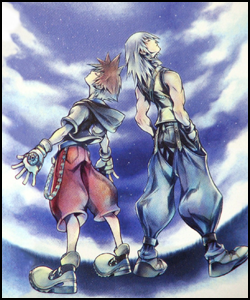
When looking at gender stereotypes, people often overlook the fact that men get their own treatment--a positive stereotype is still a stereotype, as they say. Both Sora and Riku fall into the “Knights in Shining Armor” role at times.
Sora’s character can be argued to be one-dimensional in the sense that–in spite of a progressing plot and ever-changing circumstances–his motivations and overall goals remain the same. He never gives up, his resolve is never shaken, he always smiles, and always wins (though we can blame this somewhat on game design). I’ve mentioned this in other discussions I’ve had in the past, but it seems unlikely that your average 14 year old would remain ‘normal’ after experiencing some of the genuine horrors Sora had to go through, particularly his battle with a Darkside and the destruction of his Island. Given the fairy-tale nature of the story, and the fact that these qualities are hardly undesirable, it’s easy to overlook Sora’s one-dimensional nature. Kairi, given where our society is today, is a lot more purposeful to criticize.
There is one glaring discrepancy, however, that makes Kairi’s character different from Sora, and that’s in the game’s contradictory (however subtle) representation of her character, which Shay brought up. Of course, she comes off as completely useless, getting kidnapped/spirited away/knocked unconscious for most of the game, but then there is suddenly a shining (no pun intended) moment where she becomes the only one capable of bringing Sora back after he’s turned into a Heartless, or so the game seems to make us believe. Call it love, friendship or otherwise, but it doesn’t change the fact that the message being delivered here is that the only person who could bring Sora back from the depths is the love of a woman. If Kairi was meant to be someone so integral to Sora’s success, why write her off as completely incapable for most of the game, then only show her off when deemed necessary?
The sad truth is that our society’s hegemonic views about the female persona are still stuck in second-wave feminism, post-’60s/’70s models of thinking; that is to say, while it is accepted that women are meant to do more than just stay home to clean, cook and raise the children, there are still universal postulates that collectively define all women as “women”. As you can imagine, this is inherently contradictory, and that’s why the representation of women across all sorts of media has varied significantly from one another, Kingdom Hearts included. Given the historical time frame for this development, it also explains why we barely interacted with Alice, Aurora, Cinderella and Snow White at all, Disney heroines who existed before the 1960s. Belle and Jasmine, heroines from the Disney ‘90s are much more vocal, but–like Kairi–while they were definitely more outspoken and voiced their own minds (women are meant to do more!), they were still hopelessly kidnapped because they’re helpless and can’t defend themselves (universal postulates that define all women?), a disappointing, but irrevocably present message.
Kairi–an Engimatic or Flat Character?
Hannah: I think maybe Kairi’s elusiveness in the first game is a factor that could be seen to make her even more important, due to the way the relationship between Kairi, Riku and Sora is set up on Destiny Islands. Her introduction gives us enough information to want the player to find her again–she’s sweet, has a mysterious past that Sora (and player) are curious about, and she’s part of the prize of winning the rivalry with Riku (represented by the Paopu fruit). Until she is rescued, the glimpses of her are fleeting, increasing curiosity about her and the drive to get to her. The only part I found strange was that once she was rescued, she just kind of…stood around until the end of the game.
Jackie: I had the same feeling! I remember actually revisiting Traverse Town a couple times before heading to the End of the World just to check out if she was still just standing around. And she was.
DizuniinoMahou: But knowing all of this, how would the game be affected if Kairi had played a larger role, or had even been playable like the characters in Birth by Sleep? What do you think she would’ve been able to do?
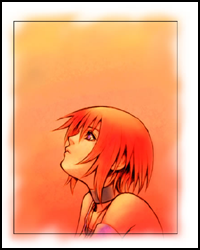
Kairi is very much an enigmatic character. She works best when she’s not in the picture because, once she’s there, you start to realize there’s not that much to her? So far she’s failed to develop as a character, but maybe that’ll change in future games.
Jackie: I totally want to see more of Kairi and would have added more cutscenes involving her had I been Nomura. For a love interest, we certainly don’t know much about Kairi’s background or her reactions to all that has transpired. I would like more of her feelings emulated like it was for Naminé (positively one of my favorite characters). Kairi has such an important role, yet we never know what she’s thinking, or how she learns of the circumstances without having any prolonged conversations with Sora. How did she deal with knowing that she’s a Princess of Heart? Or her feelings on meeting Naminé or being hunted by Organization members? This is the kind of dimension that has been lacking with Kairi’s character. I just wish we were given the chance to get to know her better. Unfortunately, I don’t see this rectified for future games, because we seem to be moving on to give the spotlight back to Sora and Riku in Re:Coded and Kingdom Hearts 3D.
Francis: I agree that Kairi’s character has remained surprisingly vague despite all the lore developments over the last nine years. I can understand the purpose of using Kairi’s enigmatic background as a way to add mystery to her character (as Hannah has suggested already), but I feel like Nomura has trapped himself in his own writing with regards to how to bring more of these details to the surface. Out of all the characters that were uniquely created for this franchise, Kairi still remains one of the most (if not the most) obscure character of the bunch. And thinking this way is not without precedent when we consider all the clues we’ve been fed in the first Kingdom Hearts, none of which are expanded upon in later titles (ex. the flashback memory of a supposed ‘Legend of Light’ told by Kairi’s grandmother; the notion that Kairi’s homeworld is Hollow Bastion; Kairi knowing absolutely nothing about her past prior to her also obscured arrival on Destiny Islands, etc).
With Nomura’s investments on characters like Aqua and Xion, we can at least say that he’s given more time in developing some stronger female characters (though the fashion in which he’s constructed their personas could be called into question), but I’d sooner like to see a much more involved Kairi, both regarding her past and her thoughts on everything thus far, in the hopefully-coming Kingdom Hearts 3 that all these games have been leading toward.
Shay: Despite all that, it’s one thing to have a female character show strength and another thing to see it diminish when the boy comes back to save the day. It’s here you can really see how discriminatory the boys’ roles are, too–both Sora and Riku are Knights in Shining Armor, saving the day, saving the girl, kicking some Heartless ass, and overall their rivalry-based friendship. Taking into consideration the roles of girls and boys in this game, one can’t help but notice the epic romance of the whole thing. I think, in the beginning, that’s the direction they wanted to take it and it changed quite a bit in the second game. Instead of just the one-dimensional action romance, they made it into something a lot more which I think allowed for the character growth of our three mainies.
Progression in the Kingdom Hearts Series
DizuniinoMahou: Is the evolution of the female role in Kingdom Hearts similar to the way Disney heroines have evolved through the years?
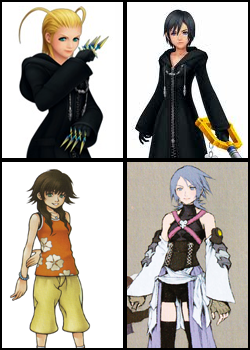
Since Chain of Memories, Kingdom Hearts has definitely offered stronger female characters to players of the series. We’ve even got a playable female character now in Aqua from Birth by Sleep. We can only assume the strong women will keep coming--in good characters and bad.
Jackie: The great change in female roles happened with the introduction of Naminé. Other pivotal roles include Larxene (who I actually really like), Xion and Aqua. Try as I might, I’m having trouble drawing a parallel with Disney worlds between games and the more central roles female characters are playing post-Kingdom Hearts I. One of the reasons is because worlds were recycled for Chain of Memories and 358/2 Days so there’s no pattern to look for. Kingdom Hearts II and Birth by Sleep, then, would be the focal points to find a trend–if there is one. In Kingdom Hearts II, other than the Land of Dragons where we find Mulan, there are few females with undeniably strong characters. I’m not counting Ursula and Maleficent because they already made their debûts in Kingdom Hearts I (and the fact that they’re evil isn’t a plus either).
That leaves Birth by Sleep…I suppose I’d single out Aqua and Cinderella? Maleficent, once again, is a returning character. Since each game comprises of both old Disney plus films from the ‘90s era, I’m not able to say that there’s a huge connection between the choices in Disney worlds used and the introduction of roles like Xion and Aqua. That’s how I interpreted your question, Dizunii.
Shay: It’s easy to spot the growth from Kingdom Hearts I to Kingdom Hearts II and all those games inbetween. Now there are characters like Larxene, who is every single bit as quirky and bad ass as Axel is (and I compare them because I think they are similar). Namine and Xion I won’t really comment on because of the argument “they’re Sora”–but even Olette has a stronger persona then Kairi did in the first game. She had a resounding impact on what the guys did for the day, the planning, and she was definitely key for organizing, which are traits they left to Riku in the Sora/Kairi/Riku friendship. There are other things that stayed the same–for example, both Kairi and Olette were relegated to being the checklists we checked in with…but, it’s still an improvement. You can also see an improvement in the Disney worlds. Hercules featured Meg, who is much more up on the feminism thing than Cinderella no doubt. There was Mulan as well, who isn’t just an idle princess in distress. She’s a warrior! And you can also use her in your party, which is awesome sauce.
But I digress: the female role has had a bigger growth than the male one has.
DizuniinoMahou: Okay, so does anyone else feel that the male role has evolved over the years–or no?
Jackie: The male role has always been really dynamic. There are the traditional good and bad guys, yes, but I give credit to the writers for developing the characters who were/are constantly straddling between good and varying shades of evil: Riku, Axel, Terra, DiZ, Xehanort (Ansem’s apprentice). They’re pretty complicated people and Kingdom Hearts has a penchant for distilling story and character elements so the audience can more easily understand them, and yet still give perspective to all the scenes to try to give players’ an understanding of all these characters’ motivations. My perfect example is DiZ. He had a revenge agenda, which manifested into a cruel scheme that used Roxas as a pawn. Yet, he knew Roxas from squat, so it was justifiable to him to protect the world from the Organization using any means necessary.
Overall, I agree with Shay–I don’t think there was much change in the male role at all. Kingdom Hearts has simply capitalized more on new characters and new story twists as time went on.
Come back for Part 2
Anyway, our Roundtable turned out to have so much discussion going on that we had to break it into two parts. Come back next Monday for Part II of our Roundtable discussion on gender issues in the Kingdom Hearts series.
Your Thoughts
So what did you feel about our Roundtable Discussion? Did you agree with anyone’s thoughts here? Disagree? Anything that wasn’t said that you were thinking of? Did you enjoy the discussion? Are you looking forward to Part II? Let us know–what you think matters!



